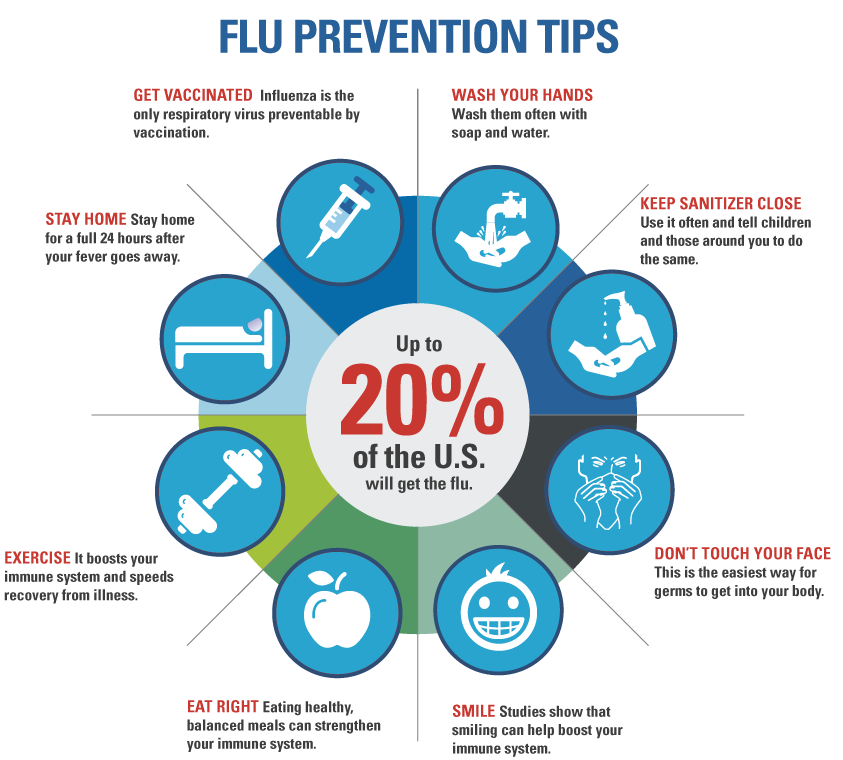The single best way to prevent seasonal flu is to get vaccinated each year, but good health habits like covering your cough and washing your hands often can help stop the spread of germs and prevent respiratory illnesses like the flu. There also are flu antiviral drugs that can be used to treat and prevent flu.
1. Avoid close contact.
Avoid close contact with people who are sick. When you are sick, keep your distance from others to protect them from getting sick too.
2. Stay home when you are sick.
If possible, stay home from work, school, and errands when you are sick. This will help prevent spreading your illness to others.
3. Cover your mouth and nose.
Cover your mouth and nose with a tissue when coughing or sneezing. It may prevent those around you from getting sick.
4. Clean your hands.
Washing your hands often will help protect you from germs. If soap and water are not available, use an alcohol-based hand rub.
5. Avoid touching your eyes, nose or mouth.
Germs are often spread when a person touches something that is contaminated with germs and then touches his or her eyes, nose, or mouth.
6. Practice other good health habits.
Clean and disinfect frequently touched surfaces at home, work or school, especially when someone is ill. Get plenty of sleep, be physically active, manage your stress, drink plenty of fluids, and eat nutritious food.
People who are exposed to cold and flu germs every day — doctors, flight attendants, teachers — know a thing or two about how to stay healthy when everyone around them is sick. Their suggestions can help you, too.

Get a flu shot. It’s the No. 1 thing you can do to prevent the flu.
Wash your hands a lot. No matter what line of work you’re in, if you come in contact with people who are contagious, you have to wash your hands over and over, says Alan Pocinki, MD. Pocinki practices internal medicine at the George Washington University Hospital in Washington, DC. Wash your hands as much as you can stand, and then some more — especially after wrapping up a visit with someone who’s sick,” Pocinki says.
It sounds so simple, but soap and water are the constant companions of doctors and nurses. To completely get rid of viruses from your skin, you need to scrub hard for 20 seconds or more. A good way to time yourself is to sing “Happy Birthday” twice while scrubbing the backs of your hands, between your fingers, and under your nails. It doesn’t matter if the water’s hot or cold — the very act of scrubbing will physically remove the germs.
Use alcohol-based hand sanitizer. If you can’t get to soap and water, sanitizer can kill cold and flu germs.
Avoid getting close to people who are sick. For example, don’t shake hands.
“Doctors tend to be very cautious about hand shaking,” says Terri Remy, MD, medical director of Medical Associates at Beauregard in Alexandria, VA. “Just explain, ‘To keep transmission of colds and flu down, I’m not shaking hands. But hello! Nice to meet you!’ They understand.”
Keep your surroundings clean. Arlington, VA, massage therapist Amanda Long asks clients to stay home if they feel bad. But to be safe, she sanitizes doorknobs and light switches between sessions. It’s a practice she swears by.
“My hyper-vigilance has paid off,” Long says. “I was sick more often when I worked in an office, where people pawed into shared candy dishes and generally just mingled in a crowded space without much attention to germs. Now that I don’t have sick days, I don’t get paid if I don’t work. And I know my job is to heal, not pass on a cold or the flu.” Beth Geoghegan, a paramedic in South Florida, says she starts her day by cleaning her work space with virus-and-germ-killing soaps.
“It may sound like overkill, but it’s not — it’s awareness,” she says. “It’s a matter of looking at your environment and thinking, ‘What could be contaminated?’ All it takes is a tiny droplet. What could have a droplet on it? And I know someone was in my ambulance for 12 hours before I got there — both patients and other paramedics. It may already look clean, but it might not be.”
It’s also a matter of context. When Geoghegan gets home from a shift where nothing much happened, she launches into her normal activities. If it’s been a day filled with sick patients, she follows a different routine. “If I saw 10 patients today, and eight had flu symptoms, I’m likely to take my uniform off the minute I get home, put it in the wash, and get right in the shower. Because you just never know,” she says.
Keep up a healthy lifestyle. It’s important to look after your own health, says Ardis Dee Hoven, MD, an internal medicine and infectious disease specialist in Lexington, KY.
“Do all the things we all should be doing on a daily basis anyway,” Hoven says. “Get adequate rest — which people underestimate — get good nutrition, don’t smoke, and keep your allergies controlled, because if they’re out of control, then your upper respiratory tree is already inflamed, which sets it up to more easily acquire a virus.”
How far would you go to avoid getting colds and the flu? HealthyWomen wanted to know, so we surveyed our readers and nearly 500 of you responded. We’re happy to report that the survey takers seem to be a health-conscious group of women who are willing to look after their health.
Here’s a look at what they said.
Nearly two-thirds of the 494 respondents said they got a flu vaccine this season. This is the single most important thing you can do to avoid getting the influenza virus. The Centers for Disease Control and Prevention (CDC) recommends a yearly flu vaccine for everyone age 6 months and older. Even though this year’s vaccine is reportedly not as effective as some year’s in preventing flu, it still can minimize the severity and length of the symptoms if you get the flu.
A whopping three-fourths say they wash their hands more frequently in the winter. This helps to avoid getting or spreading germs. While hand washing is always important, it’s more so during flu season.
More than three-fourths continue their exercise routines and take vitamins or supplements. This boosts your immune system and helps ward off winter illnesses.
Nearly three-fourths report eating a balanced diet with lots of fruits, veggies, whole grains and lean protein. Providing your body with proper nutrition helps boost your immune system, bettering your odds for a healthy winter. Only 28 percent of us confessed to regularly giving in to our cravings for mac and cheese and other comfort foods in winter. That takes willpower.
Thirty-five percent said they’d consider wearing a mask in any crowded place. Respondents were almost evenly divided on this topic. Masks do help avoid getting or spreading germs but 45 percent said never, no way, would they wear a mask. Twenty percent said they’d be willing to wear a mask on an airplane. Maybe the makers of the new fashionable face masks are on to something!
Nearly one-third say they keep their distance and avoid hugs, handshakes and close proximity when possible. It’s true that the flu can spread by talking, as well as through direct contact, so keeping your distance is not necessarily a bad idea. However, it’s not always realistic. Thirty-six percent say they never worry about contact, 15 percent say they avoid times when crowds are the worst and about 18 percent hunker down for the season and won’t go anywhere that’s not absolutely necessary.
Forty-two percent say they regularly wipe door knobs, phones, remote controls and other frequently handled devices to avoid sharing germs. The rest? Nope (though maybe that percentage goes up when we know a family member or coworker is sick).
For more information visit us our website: https://healthcaretipshub.com







No Comment! Be the first one.